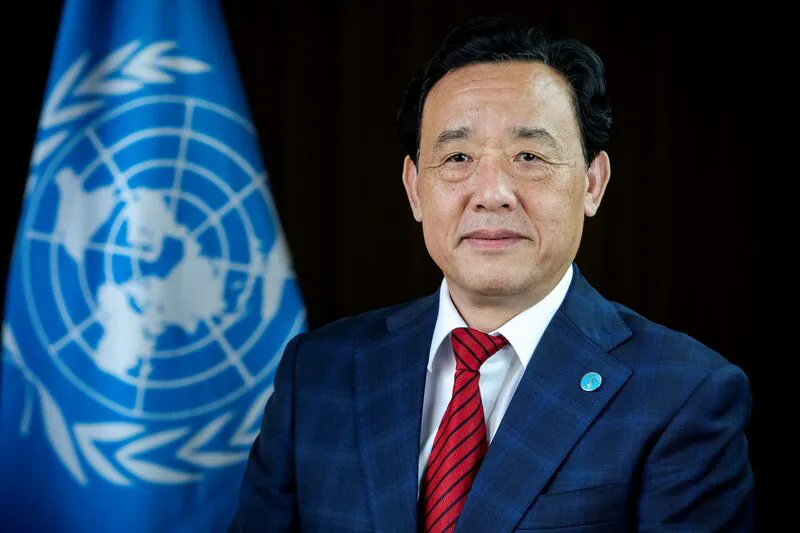Agrifood system in Asia-Pacific poised to transform through innovation and digital technologies
Advances in the region’s agri-food systems are changing how food is sustainably produced, marketed, and consumed.
The current nutrition situation in Asia and the Pacific is difficult in many areas across the region. About 40% of its inhabitants cannot afford a healthy diet, and in some areas, the fight against hunger has seen reversals rather than advances. Progress toward meeting the Sustainable Development Goals (SDGs) of defeating both poverty (SDG 1) and hunger (SDG 2) has been thrown off track amid the Covid-19 pandemic, which has devastated both lives and livelihoods.
| FAO Director General QU Dongyu. |
Luckily, the picture is not all bleak and there are signs of optimism and dynamism. Advances in the region’s agri-food systems are changing how food is sustainably produced, marketed, and consumed. This transformation reflects a greater awareness by Asia-Pacific producers and growing demand from consumers for healthier, more nutritious foods.
Crop and livestock farmers, fishers, pastoralists, other producers, and retailers – large and small – are successfully turning to innovative ideas and digital technologies. These improvements in production and sustainable resource management keep more money in their pockets, while also helping to reverse environmental degradation.
All this is helping to create a paradigm shift that is taking shape in other parts of the world too. In Asia and the Pacific, there is a clear and growing movement toward innovation and digitalization along the entire agrifood value chain.
Retail grocery and food shopping is an important example. This is not only a phenomenon of well-developed economies, with four out of five sales of online food and grocery purchases taking place in the Asia-Pacific region.
This is just one aspect of the agri-food systems overhaul that is reshaping countries rapidly across Asia and the Pacific, from West Asia, all across South Asia, Southeast Asia, and East Asia to the Pacific island countries.
In the Pacific’s Small Island Developing States (SIDS), grassroots entrepreneurs are increasingly stepping forward. Their innovative smartphone apps help producers and consumers to make informed, nutritious choices. The private and development sectors are also leveraging increasingly available data to make the supply chain of agricultural commodities to markets more efficient and timely, and to map areas vulnerable to extreme weather events. Several of these innovations were showcased at the ‘SIDS Solutions Forum’, the first of an event to be held biennially, co-convened in August 2021 by the Food and Agriculture Organization of the United Nations (FAO) and the Government of Fiji.
There are still some challenges in accessing data on demand and without interruption, as we saw when Tonga’s undersea communications cable was severed during the eruption of the Hunga Tonga–Hunga Haʻapai volcano. But these setbacks will bring forth the new ideas needed to overcome them!
At FAO, we are working with our Members across Asia and the Pacific region to transform agri-food systems to be MORE efficient, inclusive, resilient, and sustainable - to the benefit of all. Through the Hand-in-Hand Initiative, we are assisting policymakers in their plans to further leverage data, technology, and innovation to meet the SDGs targets by 2030.
We are proactively identifying and supporting digital villages across the region as part of FAO’s 1,000 Digital Villages Initiative. We are continuing to nurture and promote country-led SIDS solutions and Hand-in-Hand partnerships, which include advising on climate event mitigation and adaptation and helping to overcome the damage caused to lives and livelihoods by the pandemic and the climate crisis.
These are among the topics that will be discussed at the 36th Session of the FAO Asia and the Pacific Regional Conference in Dhaka, Bangladesh, from 8 to 11 March. FAO Members from the region – 46 in total – will come together to build on the transformational agenda and actions under the FAO Strategic Framework 2022-31, along with the recommendations of the UN Food Systems Summit 2021.
FAO is leading in hosting the recently established Coordination Hub for the follow-up of the Summit, which will support countries in further developing and implementing national pathways towards agri-food systems transformation in line with national priorities.
Working with our Members in Asia and the Pacific, we will create even stronger partnerships with academic and research institutions, civil society organizations, cooperatives, parliamentarians, and the private sector, with the inclusion of women and youth, as part of our commitment to the global efforts to build back better.
FAO is supporting the region to think big and act concretely. We are providing a constructive hand, but we need many more hands to reach our collective goals. For a better world with a better future for our children, we need better production, better nutrition, a better environment, and a better life for all – leaving no one behind.
For this, we need strong political will and efficient, effective, and coherent multilateral actions.
A high-level delegation from Vietnam is expected to join government Ministers and officials from 46 Asia-Pacific countries next month (8 – 11 March) to address the damage done to economies and livelihoods in the food and agriculture sectors, by the global pandemic, animal and crop diseases, and the ongoing disruption caused by the climate crisis. Advancing the application of innovation, science, and digitalization to help an agri-food systems transformation in the world’s biggest and hungriest region is among the main points for consideration. The 36th Session of the FAO Regional Conference for Asia and the Pacific (#APRC36), convened by the Food and Agriculture Organization of the United Nations (FAO), will be hosted by the Government of Bangladesh, in the capital Dhaka. Her Excellency, Sheikh Hasina, Prime Minister of Bangladesh, will welcome delegates to the Conference, which is convened in Hybrid modality. |
* QU Dongyu is the Director-General of Food and Agriculture Organization (FAO) under the United Nations.












